In this post, I am going to address a comment I get a lot off when I include red palm oil in my West African recipes. I have previously addressed the problem in an Instragram post. However, I wanted to write a blog post as a reference on my website. Every week I get questions about why I use red palm oil in my food. “Isn’t that bad for the environment?” “Why are you calling yourself eco friendly and using palm oil?”
Stop policing and question my food choices and ingredients I use. Palm oil is essential to maintaining my cuisine and I will not have it any other way. I will explain why in the next few paragraphs
The problem with palm oil production is because of colonialism, capitalism and imperialism. The discourse of palm oil has been so routed in those ideologies and leaves little room for people to actually look at where it all started.
Red Palm Oil in West African Culture
The oil palm is indigenous to Western Africa. For centuries the tree has been essential in the fabric of life. The tree grows wild in the forest or planted in cacao farms for additional shade. The branches are used for brooms and housing. The sap from tree is tapped for local alcohol. The fruit consists of the red flesh and the kernel. The red flesh is used for soups as well as a flavourful red oil. The red oil is not only an essential ingredient in many stews, it also used to treat mild poisoning. The kernel is not used to the same extent but the oil is extracted for frying or traditional soup making.
West African chefs always source their red palm oil from local small scale farmers . If the chef is in the diaspora, they purchase red palm oil from the 1000s of African stores across North America or Europe who also purchase their palm oil strictly from farmers in West Africa.
So what exactly is the problem with palm oil?
Palm oil consumption and production in West Africa has nothing to do with the problem of palm oil production in South East Asia. To understand the current issue of palm oil, we need to discuss the history of palm oil.
How palm oil got to South East Asia
Oil palm was introduced to South-East Asia by the Dutch who brought four seedlings from West Africa. Here the oil palm grew faster with larger kernels because of more optimal climate and soil conditions. After the discovery of hydrogenation, palm kernel oil truly NOT RED PALM OIL became a profitable business. Oil palm plantations multiplied exponentially, causing serious problems in maintaining the biodiverse forests in South East Asia. Now palm kernel oil is used in our cosmetics, foods, cleaning products, and yes, even your favourite vegan butter.
HOWEVER, the production of palm oil and environmental issues has NOTHING to do with consumption of red palm oil by West Africans. Our palm oil is grown at small scales by West Africans and is not consumed at astronomical levels. Our recipes also focus heavily on RED PALM OIL, which is not usually sold by companies sourcing palm oil from South East Asia.
With every recipe I create, I always encourage people to shop at the 1000s of African stores that are littered across the Western world. This is where you will get high quality and locally sourced red palm oil
How the conversation of palm oil is an example of policing Indigenous foods
“Suggesting that West African cuisine reconsider an ingredient that corporations have come to produce and exploit is like arguing a fonio farmer in Senegal should not water her crops because somewhere else in the world water is sold in plastic bottles.”
Yewande Komolafe
Unwanted critiques of palm oil by people with little cultural knowledge or association with West Africa is prejudice. It is just another example of how indigenous ingredients are policed. It is frustrating that many West African chefs have to constantly remind others that their ingredients are sacred. Palm oil cannot be changed or substituted. It is grown and harvested the indigenous way–sustainably and locally. We are always burdened of continuous education or repeating ourselves because our voices never reach far and wide enough. We do not hold high ranks in food and media spaces so we have to keep repeating ourselves.
I hope that you can learn from this and pass it on. Please also take a look at Nigerian chef and recipe creator, Yewande Komolafe’s article. (Click here)
I value learning the importance of other ingredients from different cultures, and I hope people do the same for West African cuisine without jumping to conclusions.
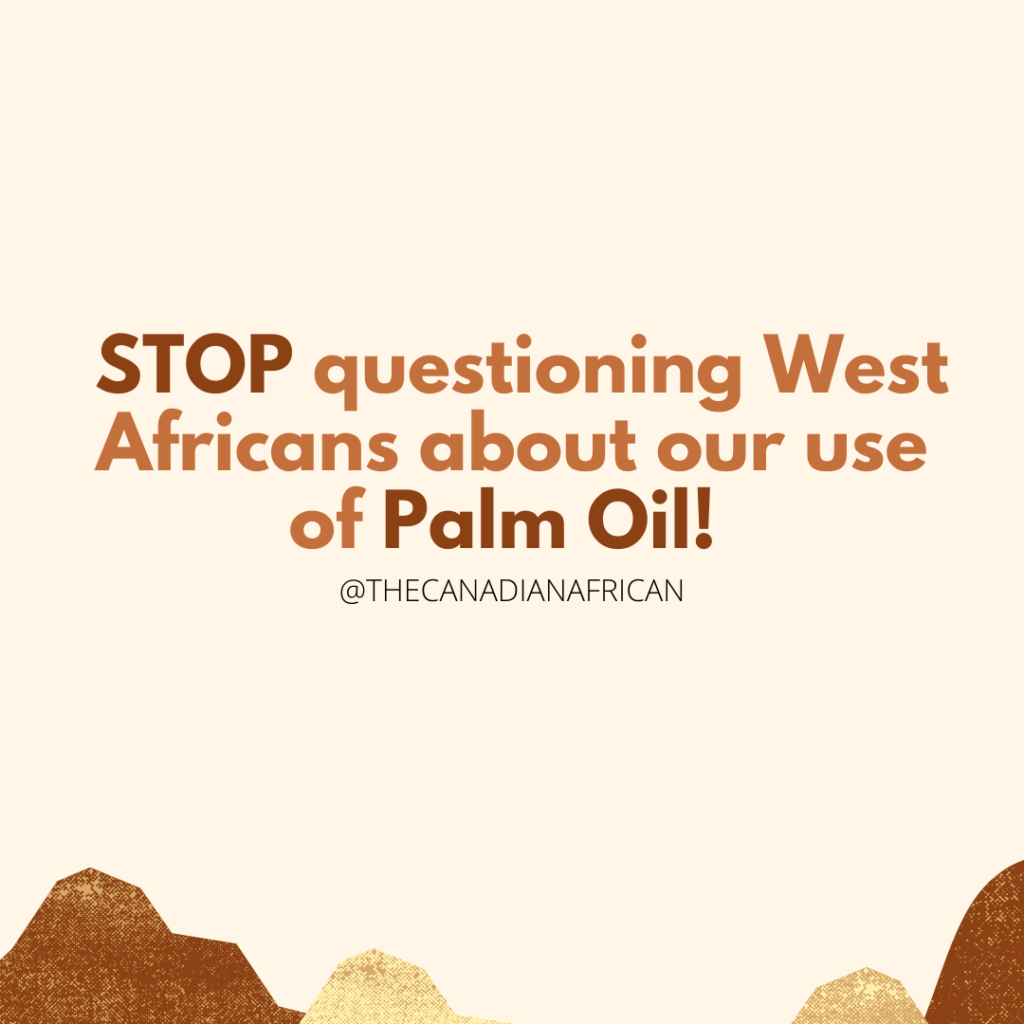
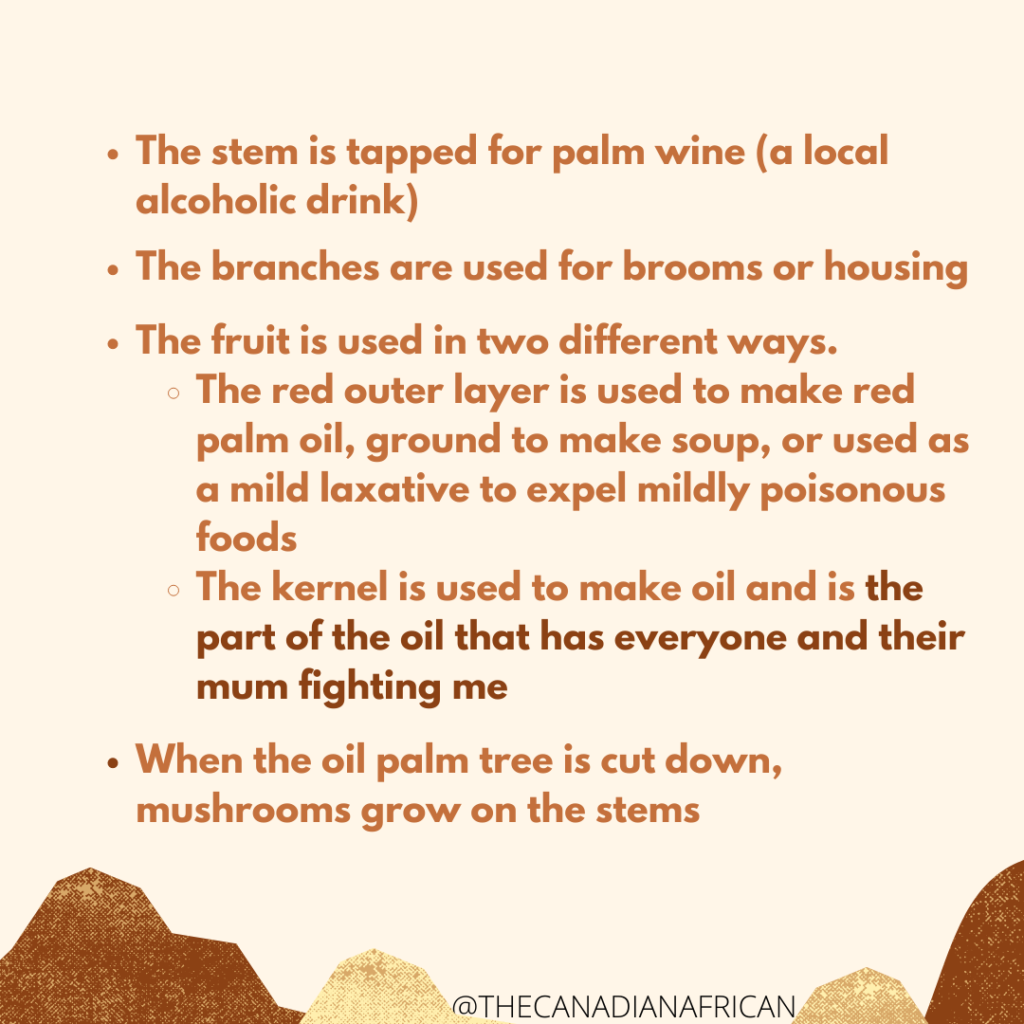
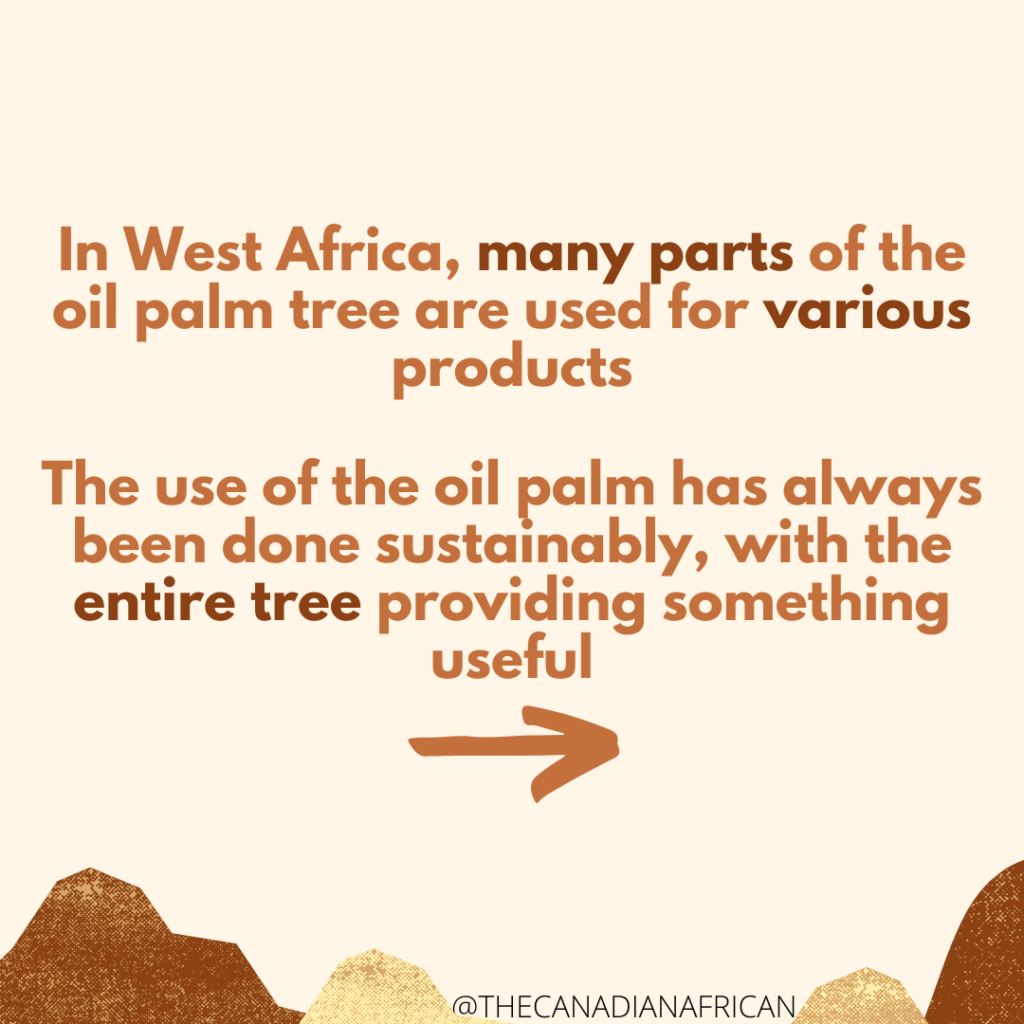
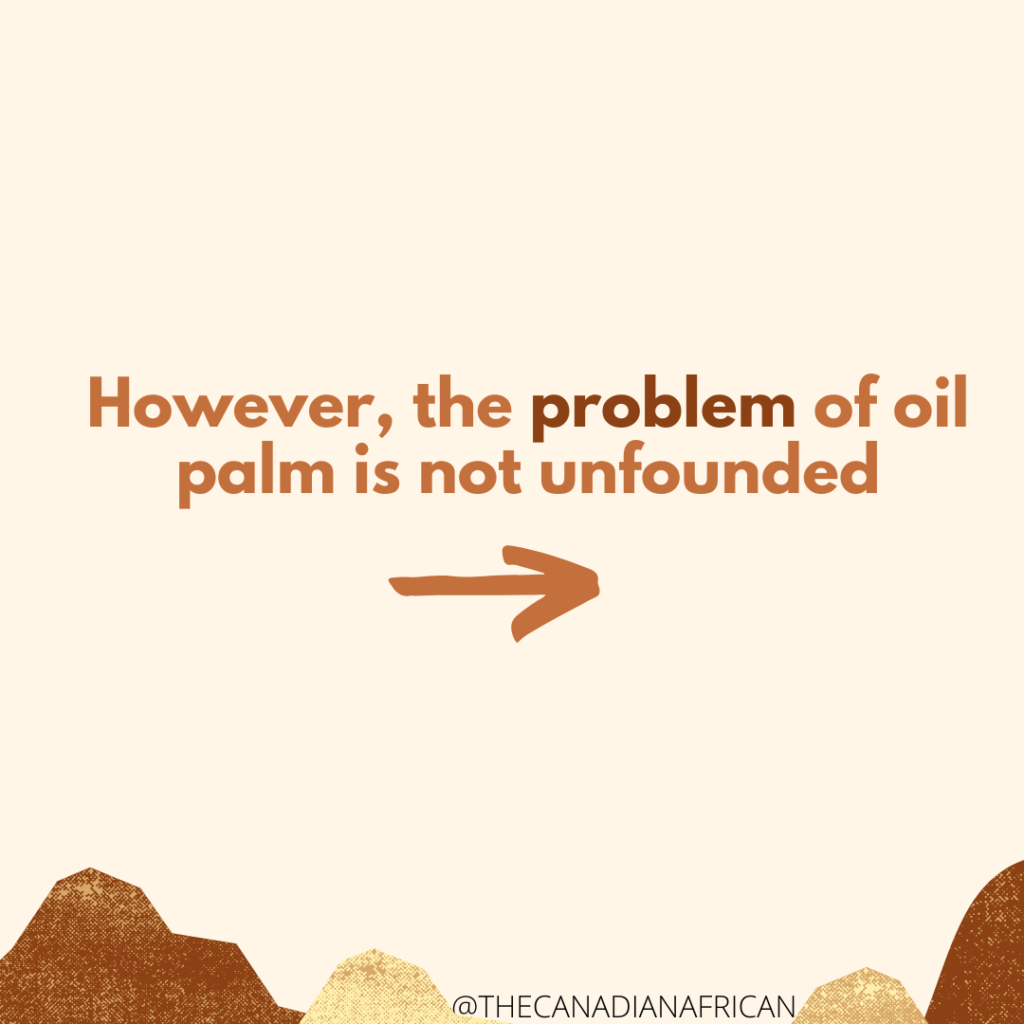
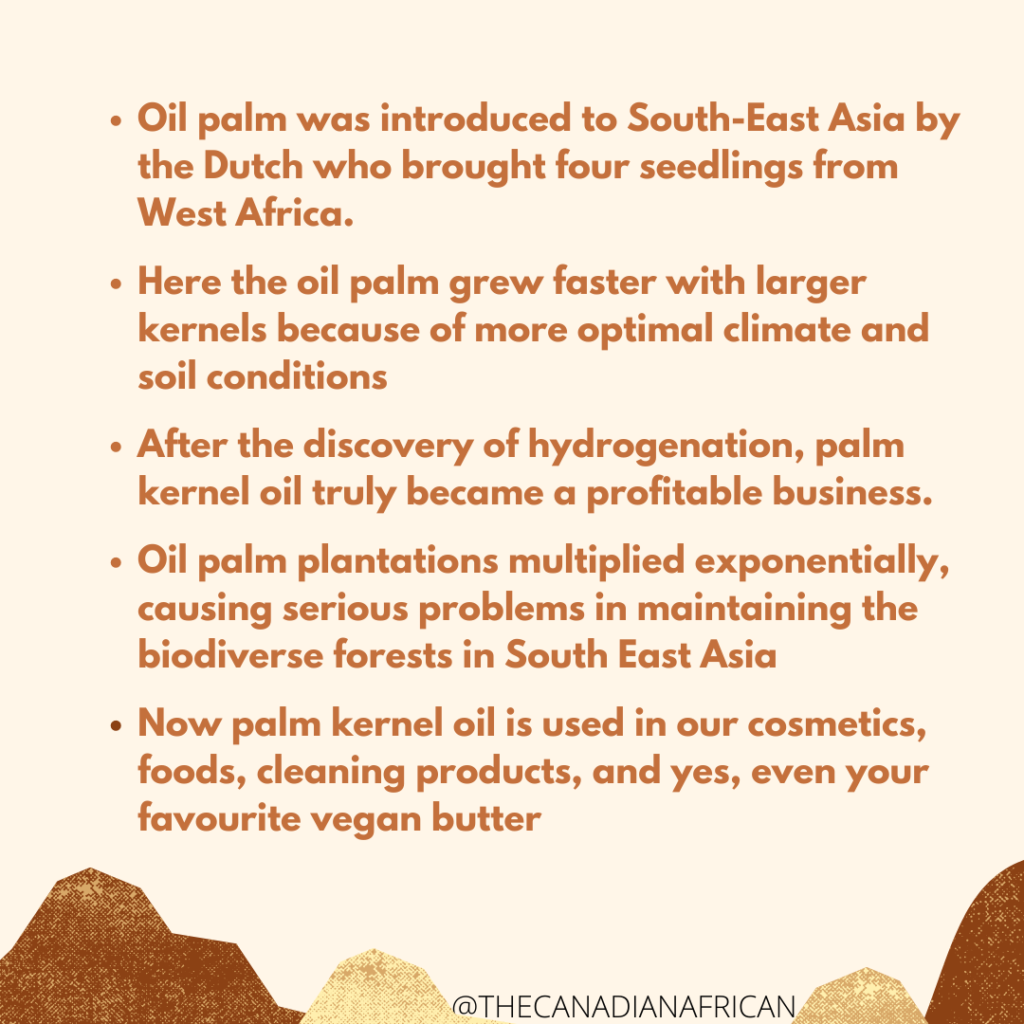
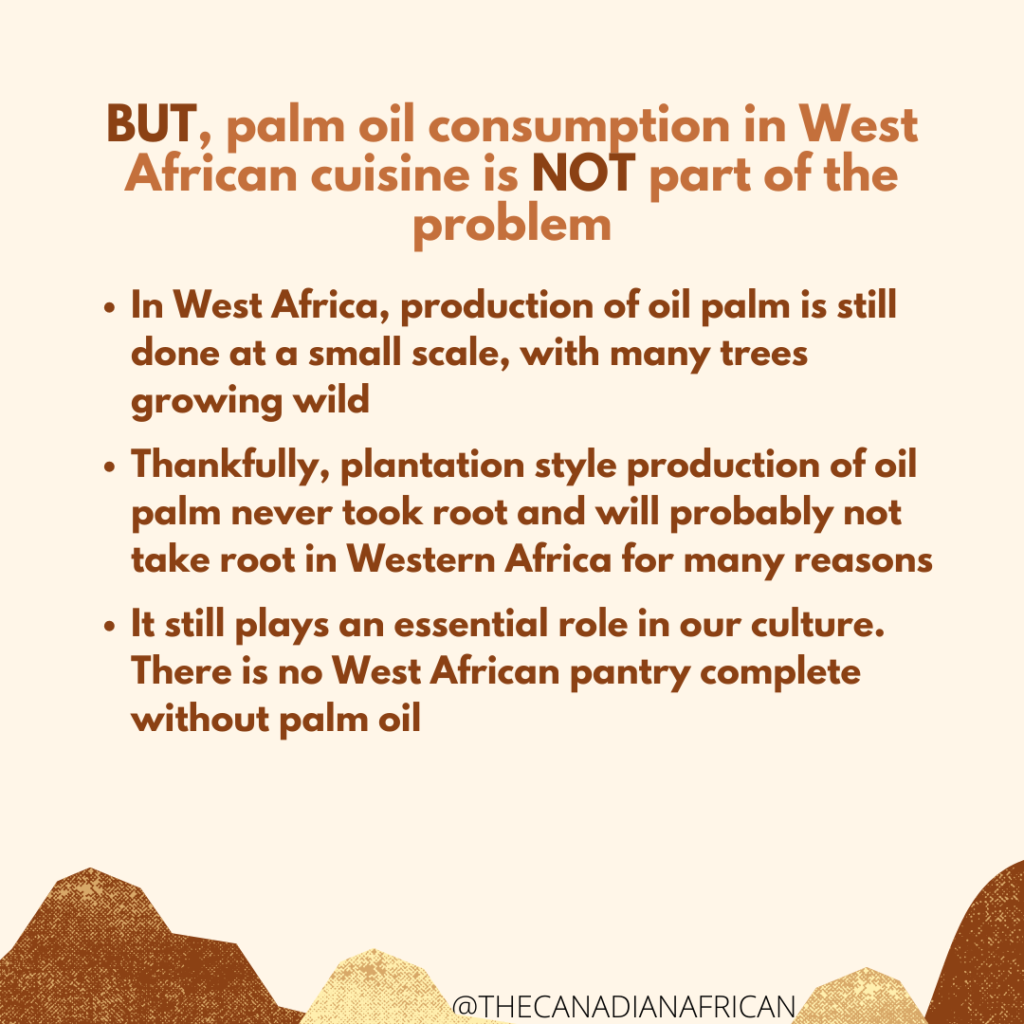
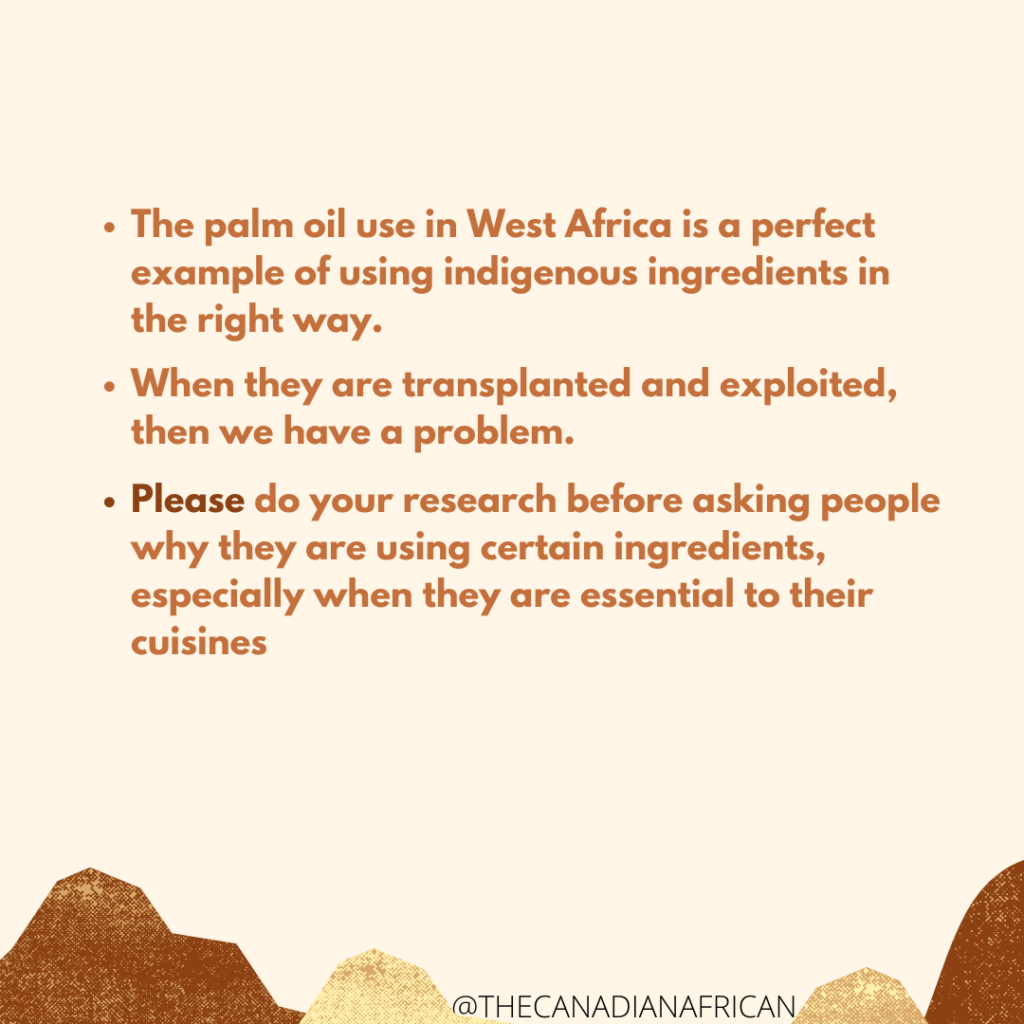

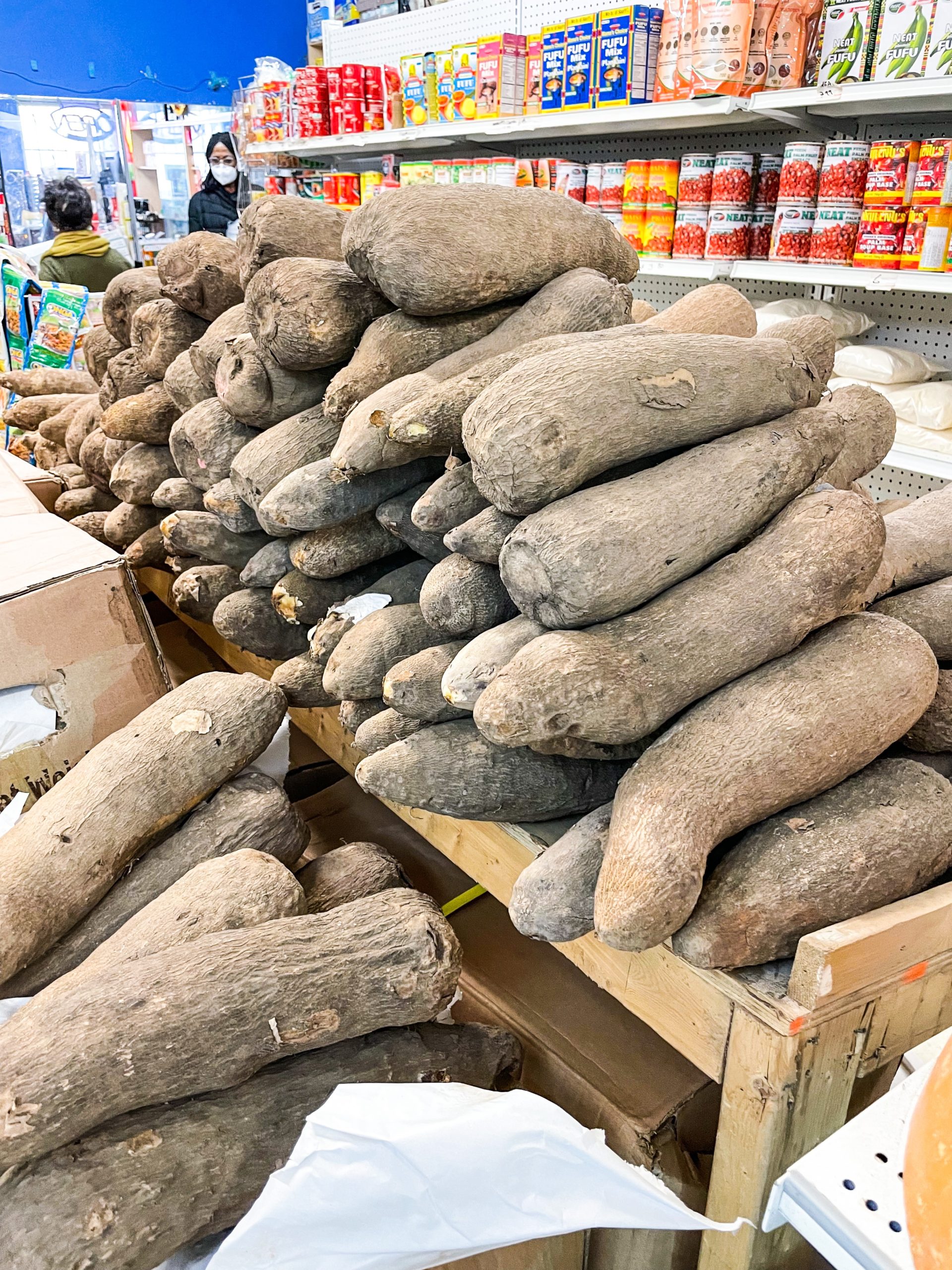
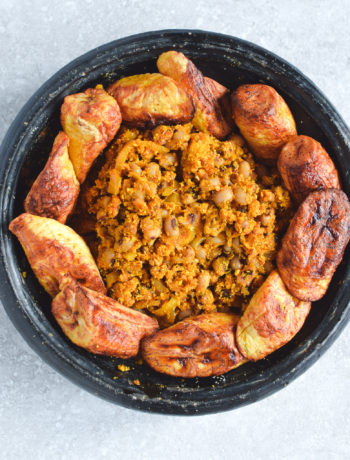
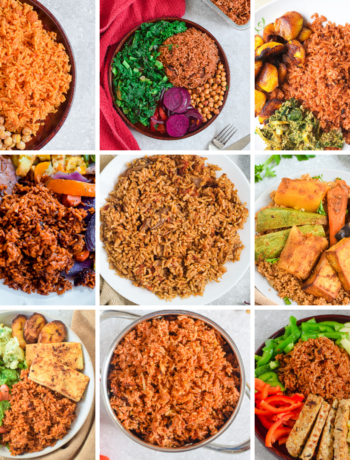
23 Comments
Jen
January 16, 2021 at 9:39 pmThis is so helpful. Thank you.
Vegan Plantain Porridge (Nigerian - Inspired) - The Canadian African
January 30, 2021 at 6:27 pm[…] Red Palm Oil: this oil gives a nice red colour and it bring a really nice buttery flavour. If you want to learn more about why I include palm oil in my diet, please refer to this post (Palm Oil in West African Diet) […]
KRUBOR D ONABAJO
January 31, 2021 at 2:25 amWow, simply put, I commend you on this article. I have lived in the west from 1978 to now, and have always wanted my torborgee oil. Liberian born American, there’s no other cuisine that can replace my torborgee oil, another form of deep red Palm oil. Growing up, we were told that “everything African was terrible and bad for human consumption”; that included palm and coconut oils. But today, coconut oil is excellent for human consumption to the fact that it is manufactured and sold in capsules for human consumption as vitamins. These are seen and sold also in large containers in large stores like Sam’s Clubs, Costco stores all around the U.S.. Why is coconut oil now good for human use all of the sudden? Palm oil, a red colored, vitamin enriched oil, has kept us, West Africans alive, given us rich dark skins etc. It comes in its natural forms and tastes when cooked in which ever way. Why would We, palm oil lovers want to change to anything else?
Westerners have down played everything African, and have forgotten that we are.just educated or even more, and now refuse to go back to that “slave mentality” thinking, that everything black, African is not good for humans. We’re too educated and knowledgeable about our lives and do not need your input. Eat yours and we’ll keep enjoying ours.
Isaac Kusi
January 31, 2021 at 11:51 pmRed Palm oil is the richest oil on earth. The red color is beta carotene which converts to vitamin A. Red palm oil contains vitamins E and Coenzyme Q10. It has the highest amount of Tocotrienols found in any oil, this is a higher form of vitamin E.
Kimberly blackwell
February 1, 2021 at 8:42 pmNdewo, daluu, for allowing others to see what the beautiful amazing tree is all about..and that red palm oil from west africa is the best..biko abeg cook me some that ofe egusi..happy new month and chineke gozi gi..😊🙏
Ghanaian Vegan Red Red Stew (No Palm Oil) - The Canadian African
February 4, 2021 at 10:03 pm[…] Oil: This recipe is made without Red Palm oil which is a very important ingredient but people have asked for non-red palm oil recipe. Please swap out the vegetable for red palm oil if you have access to it. Here is a blog post about Red Palm Oil in West African Cooking (click here) […]
silvia
January 13, 2025 at 3:46 pmthank you for this very informative article. in the west there is so much information about palm oil being bad, but I figured it was due to the way it was sourced and synthesized by the corporations. anyways thank you for the information, i am Italian and for the first time trying west African recipes. 🙏🏼
TOGO: Peanut and sweet potato velouté | Locally Foreign
July 17, 2021 at 4:09 pm[…] picked up some red palm oil to cook with – it’s the cooking oil of choice for West African dishes, and adds a […]
ash
August 20, 2021 at 1:26 ami will never forget in a college course we watched a video about harrison ford going to indonesia to look at the destructive palm oil farms, and harrison was like “stopping this would be equal to taking 500k cars (or some other huge number) off the streets of L.A.” and none of us really challenged that!! but like… idk harrison, stick to getting those cars off the streets in your own city!!
An Introduction to Ghanaian Food - The Canadian African
October 9, 2021 at 6:40 pm[…] As you move south, coconut and palm nut become commonplace. The red palm nut is an essential part of many Ghanaian soups and stews. Indigenous to West Africa, they usually grow wild or are included in agroforests amidst cacao and cassava plants. The entire nut (both the kernel and the shaft) is consumed in soups and stews. If you want to read more about palm oil in West Africa, please check out this blog post. […]
Vegan Cassava Leaf Stew (Pondu) - The Canadian African
November 2, 2021 at 6:40 am[…] For more information on the use of red palm oil in African cuisine, please take a look at this post. Unfortunately, these two ingredients cannot be substituted as they serve as the essence of this […]
Veyan One Pot Ayoyo Soup - The Canadian African
November 11, 2021 at 12:04 am[…] Red Palm Oil: Red palm oil adds richness to the stew. If you are curious about red palm oil in African cooking, please check out this link. […]
Vegan Ghanaian Palm Nut Soup - The Canadian African
November 27, 2021 at 12:23 am[…] If you want to read more about palm oil in the African context, please check out this post. […]
Emily Nixon
March 26, 2022 at 5:11 pmThank you so much! I had no idea.
EiCYrmgHQqcPNlj
November 16, 2022 at 7:05 pmtgulTbNmvc
Vegetarian Efo Riro - The Canadian African
December 2, 2022 at 12:44 am[…] Palm Oil: Palm oil is the oil from the palm fruit, which is indigenous to West Africa. For more details on palm oil, please check out this blog post (click here) […]
Vegetarian Egusi Soup - The Canadian African
December 22, 2022 at 12:58 am[…] Red Palm Oil: This adds a really nice buttery flavour. If you are concerned about the use of red palm oil, please check my blog post on red palm oil (click here) […]
brandie
March 5, 2023 at 12:34 amI’m waiting https://is.gd/dBsd60
Tea
March 8, 2024 at 4:04 pmHi,
I’ve bought my first ever bottle of red palm oil, because I’m very curious to try some west African dishes for the first time. I wish I saw your post sooner, because I spent half a day googling “palm oil in Ghana” to see if it’s environmentally ok to buy this oil :).
Anyway, my oil is of a brand “Afroase” and it’s made in Ghana. My question is – how is red palm oil supposed to smell/taste? Are you familiar with it being an acquired taste for new palates? Because I’m very curious to try some dishes with it, and I’m open to it tasting much better once it’s mixed with other foods and cooked with, as opposed to tasting the pure oil; that maybe it gives that “somethin’-somethin'” special, like it just wouldn’t be the same without it, even if it tastes unpleasant on its own. Is this how it is regarded? Because I really seem to dislike the taste on its own. It’s very difficult for me to explain how I perceive the taste. I don’t think it’s ‘rancid’ per se, or at least I *hope* it isn’t (and it’s 3 years before the ‘best before’ date). The smell is also quite pungent, with an almost ‘fishy’ quality to it? I googled *a lot* before ending up here, and got quite scared reading descriptions of ‘nutty, buttery, almost sweet taste reminiscent of carrots’, as this *profoundly* doesn’t describe my oil :).
I would appreciate a few words from a seasoned user like you. Thanks!
thecanadianafrican
March 12, 2024 at 10:36 amHi Tea, thank you very much for the comment. Palm oil is quite tricky to explain, the smell is quite strong, should be buttery and savoury. In hind sight, it probably is an acquired taste. In terms of fishy, that is not something I can say as a major flavour profile but i can understand how that is the case. I did look into the brand you mentioned and do not really know of it. We do not consume palm oil on its own as it is much better used to cook foods. I will suggest giving a west african recipe a try, perhaps Egusi soup or okro stew a try with the palm oil. Then come back to this comment and let me know what your thoughts are. I am happy to continue to trouble shoot with you.
Tea
March 13, 2024 at 6:09 pmAw, thanks so much. It’s such a disadvantage to be cooking something from another part of the world for the very first time and having no reference! I live in a place where I can’t visit a west African restaurant, or an African market or something like that.
Ok, so what I’m hearing from you is that palm oil might not taste nice at all on its own, but still taste good in a dish? I can work with that! 🙂 I was hoping you’d recognize the brand, but thanks for looking into it anyway.
On my quest for answers I did come across this forum: https://www.nairaland.com/32796/smelly-palm-oil where some Nigerian people suggest that there are actually two types of oil, one of them smelling very unpleasantly.
I was thinking of trying Ghanaian red red stew. How big of a difference would it be to use ordinary white beans (cannellini)? I know it’s culturally a ‘no-no’ :), but I really can’t get my hands on black eyed peas here. Would it be a good enough substitute?
thecanadianafrican
March 15, 2024 at 2:35 pmI am not sure how helpful the forum might be given that the brand you have is Ghanaian. In terms of taste, I guess it is an acquired taste because palm oil on its own has always been pleasant to me but I can see how it can be a bit off for others. For the red red, I wouldn’t suggest white beans as they are too soft. You can try it with red kidney beans. All the best
Tea
April 21, 2024 at 4:15 pmHi!
I finally got around to trying my palm oil in my first ever West African stew that uses it. I myself could strongly sense the oil in the stew, and it threw me off a little bit as I’m not used to it, but everyone else thought it was great. I can see myself experimenting with it a bit more. I also think I used a bit much. In the future I’ll limit it to 2 tablespoons per batch of stew, and make up the rest with a more neutral oil.
I took your advice and made red red stew with red kidney beans. So I guess my stew was called “red red red”? :))